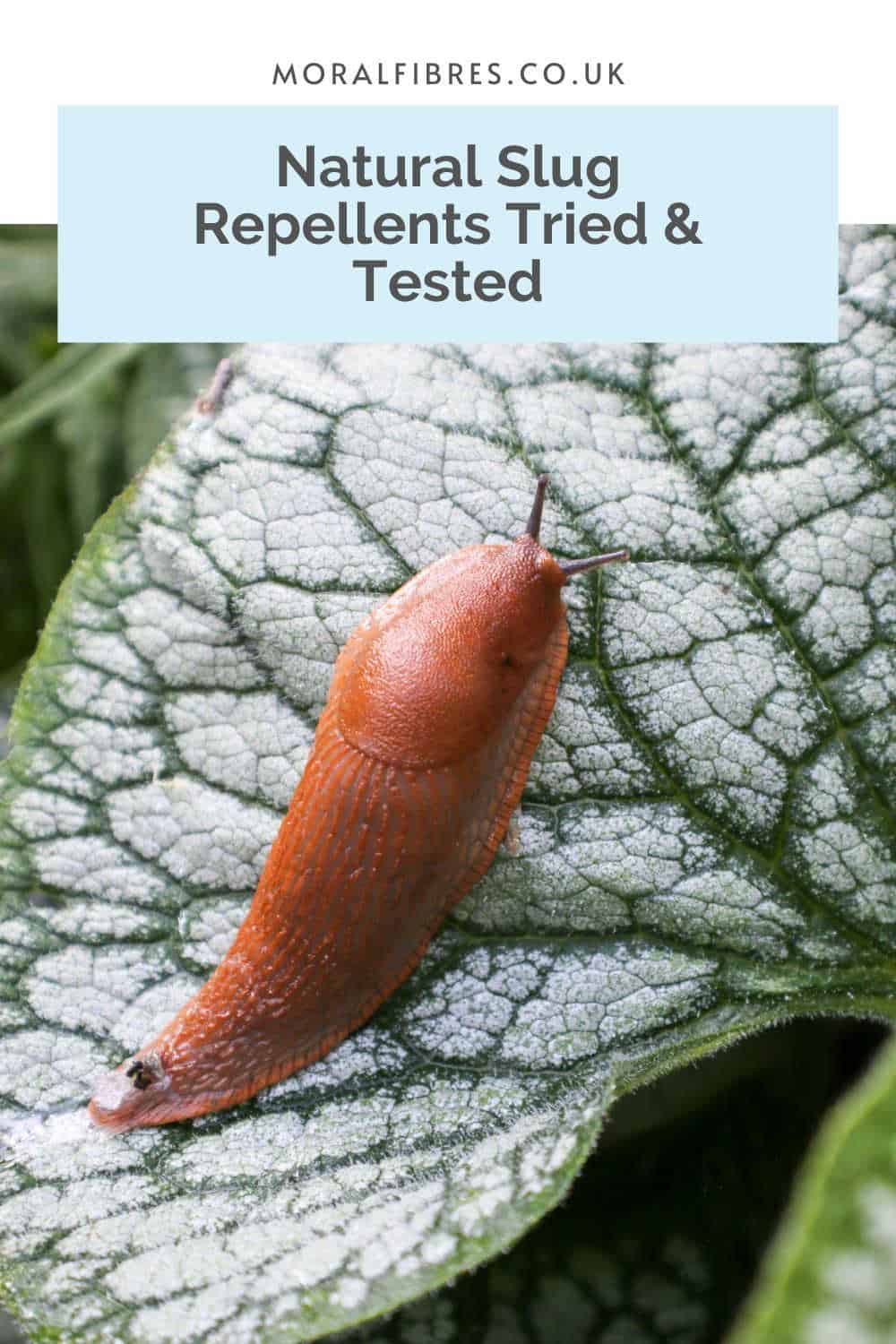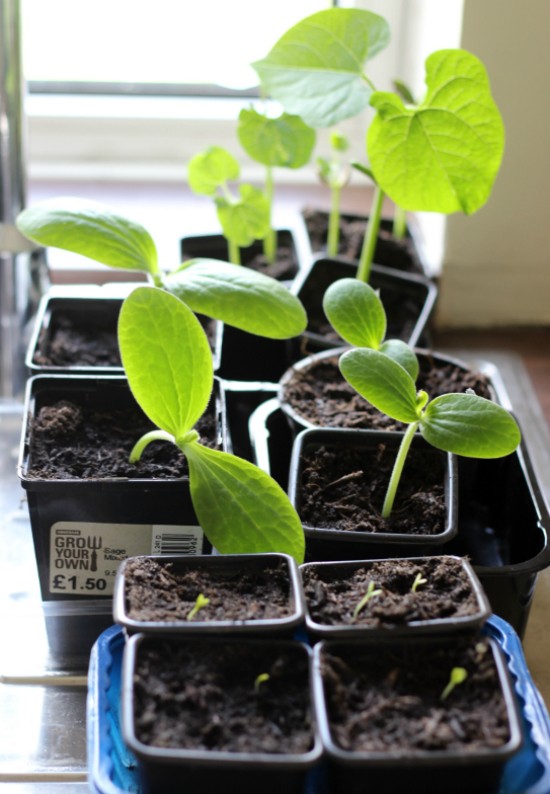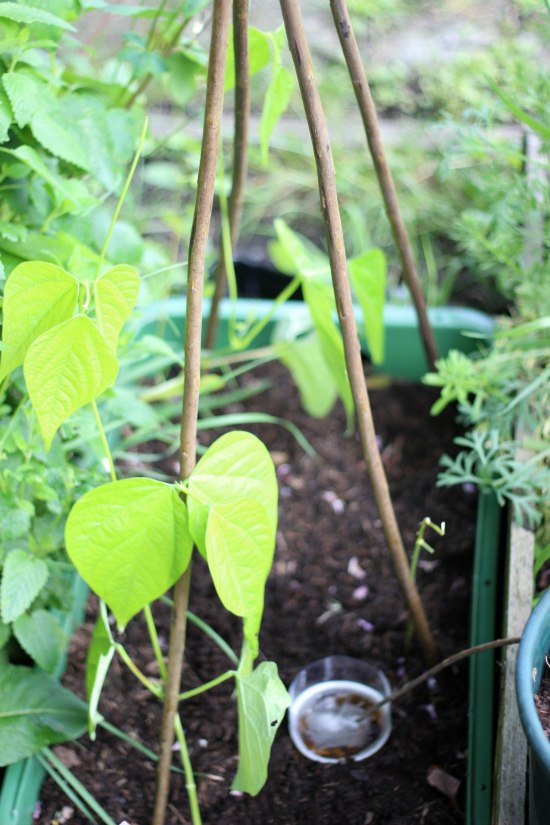10 Natural Slug Repellent Methods Tried, Tested & Rated
To support the running costs of Moral Fibres, this post contains affiliate links. This means Moral Fibres may earn a small commission, at no extra cost to readers, on items purchased through these links.
Do any natural slug-repellent methods actually work? I’ve tried out 10 different natural methods in my garden – here’s how I got on.
My partner and I have been attempting to grow our own fruit and vegetables for about 16 years now.
We started off growing things on the balcony of our rented flat, before progressing to growing things in the small garden of our first flat. We then moved on to allotments – trying out three different allotments. Then we had two kids and never seemed to have the time or energy to make the allotment work. We gave up the allotment, and now we grow what we can in the tiny yard of our cottage.
Despite having many types of growing setups over the last 18 years, there’s been one constant. Slugs. Chomping through all of our prize vegetables that we’ve spent hours lovingly tending.
I know that slugs (and snails) do a pretty important job in nature. They munch through rotting vegetation, which helps to recycle nutrients back into the soil. However, it can be pretty annoying when instead of feasting on a pile of rotting leaves, slugs decide to gorge on your prize vegetables or flowers that you’ve spent all season trying to grow.
Rather than turning to slug pellets, I’ve tried a whole host of natural slug repellents. This is because traditional slug pellets are harmful to wildlife, as they contain a toxic ingredient called metaldehyde. Whilst wildlife, such as birds and hedgehogs, are unlikely to eat the pellets they can be harmed if they consume a dead snail or slug that has eaten the pellets.
But do any of the natural methods to deter slugs actually work? I’ve rounded up 10 different methods that we’ve tried over the years – showing you how we got on.
10 Natural Slug Repellent Methods We’ve Tried

Here’s a round-up of the natural repellents we’ve tried to deter slugs from our plants. As you can see it’s been a really long-running battle:
Copper
Some people swear by copper piping and copper rings as a means of natural slug repellent. Apparently copper carries a charge that interferes with the slug’s slime. When slugs and snails come in contact with the copper, it causes a small, yet harmless electric-shock-like reaction. As it’s uncomfortable, the slugs and snails supposedly avoid copper.
But does copper work as a deterrent? Well, when we had an old gas fire removed from our first flat, a load of copper piping came out. Rather than binning it, I asked the gas engineer to keep it for me. Which they did. And I then reused the copper piping, by putting it around our vegetable seedlings, much like a fortress.
I felt smug and confident that our precious seedlings were going to make it. But what I found was the inverse. The copper was completely ineffective in repelling slugs. Our plants got munched to high heaven. I even saw slugs and snails sitting on the copper piping, not giving two hoots that they were sitting on copper. If they could have given me the fingers, then I’m sure they would have. The slugs were that brazen.
Result: Slugs 1 – Wendy 0
Eggshells
Other people swear by placing smashed-up eggshells around the base of your plant. Apparently, this acts as a natural repellent as the shells are sharp and uncomfortable for the slugs to crawl over.
I tried the eggshell method repeatedly and still, my plants got munched. I saw slugs crawling over the eggshells quite merrily.
The eggshells have to be clean and dry – so the minute the shells touch the soil, you water your plants, or it inevitably rains then your eggs annoyingly no longer act as a deterrent. I say compost your eggshells instead – it’s a much better use of them.
Result: Slugs 2 – Wendy 0
Gravel
As a variation on the eggshell theme, some people suggest placing gravel around your plants as it’s too uncomfortable for slugs to crawl over. I say save your money. Our current yard is covered in gravel – we now grow all our produce in pots – and slugs happily crawl over the gravel to get to something tasty. We’ve even tried using sharper, finer gravel to top our pots, and the slugs couldn’t care less that it’s there.
We even get slugs moving across the gravel to get to our back door, and then squeezing under the tiniest of gaps to get into our kitchen. I swear they’ve got it in for us.
Result: Slugs 3 – Wendy 0
Coffee
Another top natural slug-repellent tip I heard of was to place coffee grounds around the base of your plant. This is because the caffeine in coffee grounds is said to be mildly toxic to slugs, and so they avoid it.
Once I saved all the coffee grounds from work (my workmates drank a lot of coffee!). I then carried them home on the bus, spread them around my plants, and still my plants got munched.
I think the problem is that when the coffee grounds get wet – through watering or rain – the coffee grounds get washed away. This means you would need an awful lot of coffee grounds for this to even stand a tiny chance of working. Save your grounds and use them as a mulch.
Result: Slugs 4 – Wendy 0
Hay
Another method I tried was placing hay around my plants. I don’t even know what planet I was on to even begin to think this could work. I found using hay as a natural repellent actually made our slug problem worse. The slugs seemed to be sheltering in the hay rather than repelling them and were also possibly laying their eggs in there. Don’t be as foolish as me. Learn from my mistakes!
Result: Slugs 5 – Wendy 0
Wildlife Ponds
Another natural slug control method we tried was as natural as it gets – encouraging frogs and toads into our garden. Frogs feast on slugs so we thought making a frog-friendly habitat would work wonders.
We built a little wildlife pond in both the garden of our flat and in the yard of our current home. Both were frog and toad-friendly yet we never saw one frog or toad in it. One of our neighbours found a frog in her pondless garden (typical!), so she put it in our pond. It didn’t seem to hang about – we never saw it again – and still, the slug population remained as high and aggressive as ever.
Result: Slugs 6 – Wendy 0
Growing Indoors

One year we decided to take quite a firm stance and upped our natural slug-repellent game. We started growing our plants indoors until they got to a good size, in the hope that they would be large enough to withstand a slug attack. Or so we thought. Less than one week in the garden and one pea plant was completely and utterly decimated by slugs, and one squash plant was very nearly a goner.
Result: Slugs 7 – Wendy 0
Manual Collection
Another summer, we decided that rather than trying to repel the slugs, we would beat them at their own game, and manually collect them. My daughter and I would go out in the evening into the yard with a bucket and do “snail patrol”. This would involve picking up any slugs and snails and then decanting the live slugs and snails in the woods across from our house.
This is because going out at night and picking off the slugs (and snails) is a good time to catch them in the act. Slugs mostly feed at night to keep their moisture levels up and avoid predators, such as birds and frogs. Just pick them off, put them in a bucket and take them fairly far from your prize vegetables.
I have to admit, I’m a bit squeamish when it comes to handling slugs (some bad experiences involving bare feet – I’ll leave it at that!) but I persevered. It didn’t seem to make much difference. The vegetables we didn’t want to be munched still got munched. I think in hindsight we weren’t taking the slugs and snails far enough away. Apparently, they should be taken at least 20 metres from your garden to prevent them from coming back.
Results: Slugs 8 – Wendy 0
Beer

One year we gave up on natural slug repellents and turned to beer traps in desperation. Apparently, the sweet beer smell is irresistible to the slugs and they climb in, drink the beer and forget to climb out again. Which is a pleasant way of saying they drown.
I cut some plastic bottles in half and filled them with half beer (the cheapest nastiest can of lager could find in my local shop – not the good craft beer!) and half water. I then dug them into the ground, near my prize vegetables, with a lip of about 3cm sticking out of the soil so beetles and other creatures didn’t accidentally fall in. In case any other creatures did fall in, I popped a stick in so they could climb out:

What can I say – even the nuclear option didn’t work. Can you see the plant the slugs completely destroyed right next to the beer trap?! There’s nothing more than a green stalk, where once verdant leaves were!
My conclusion was that either slugs in West Lothian are hard as nails, or beer traps don’t work. It was simply a waste of good beer. Well, actually, it wasn’t good beer. Let’s just say it was simply a waste of money and time!
Result: Slugs 9 – Wendy 0
Salt
The classic natural slug repellent is salt, but I have to say I’m reluctant to try this. The salt will probably get washed away when it rains or you water your plants. Plus it might increase the salinity of your soil, which isn’t too great for plants.
Salt can also be caustic to other creatures that visit your garden – think the tiny paws of hedgehogs – so I’d say this method is best avoided.
Result: Slugs 10 – Wendy 0
So What’s The Answer?
I think trying to work against nature – and using any kind of slug repellent – no matter how natural, isn’t going to work. From my dismal yet tenacious attempts to usurp our garden’s slug population, I would say that, like that famous Jurassic Park quote, slugs find a way.
I think embracing more wildlife-friendly gardening techniques is the way forward. We should welcome all creatures into our garden, with the idea being that a healthy ecosystem means that one creature won’t dominate your garden. Creating bee-friendly gardens encourages other creatures that eat bees and slugs. Encouraging wild birds is also beneficial as they eat slugs too.
And whilst our wildlife pond didn’t achieve its goal, I think we were too quick to judge. I think these things take time to settle in and attract the wildlife that frogs, toads and newts need to survive.
Found this post useful? Please consider buying me a virtual coffee to help support the site’s running costs.




